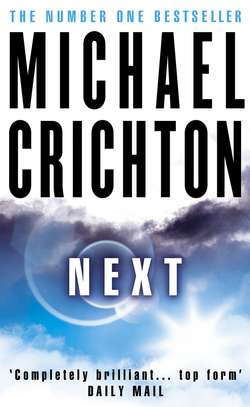Читать книгу Next - Michael Crichton, Michael Crichton - Страница 16
CH010
ОглавлениеAt the Radial Genomics lab in La Jolla, Charlie Huggins twisted his flat-panel screen around to show Henry Kendall the headline: TALKING APE CLAIMED FRAUD. “What’d I tell you?” Charlie said. “A week later, and we learn the story’s a fake.”
“Okay, okay. I was wrong,” Henry said. “I admit it, I was worried about nothing.”
“Very worried…”
“It’s in the past. Can we talk about something important?”
“What’s that?”
“The novelty-seeking gene. Our grant application was denied.” He began typing at the keyboard. “Once again, we’ve been screwed—by your personal favorite, the Pope of Dopamine, Dr. Robert A. Bellarmino of the NIH.”
For the last ten years, brain studies had increasingly focused on a neurochemical called dopamine. Levels of dopamine seemed to be important in maintaining health as well as in diseases such as Parkinsonism and schizophrenia. From work in Charlie Huggins’s lab, it appeared that dopamine receptors in the brain were controlled by the gene D4DR, among others. Charlie’s lab stood at the forefront of this research, until a rival scientist named Robert Bellarmino from the National Institutes of Health began referring to D4DR as the “novelty gene,” the gene that supposedly controlled the urge to take risks, seek new sex partners, or engage in thrill-seeking behavior.
As Bellarmino explained it, the fact that dopamine levels were higher in men than women was the reason for the greater recklessness of men, and their attraction to everything from mountain climbing to infidelity.
Bellarmino was an evangelical Christian and a leading researcher at the NIH. Politically skilled, he was the very model of an up-to-date scientist, neatly blending a modest scientific talent with true media savvy. His laboratory was the first to hire its own publicity firm, and as a result, his ideas invariably got plenty of press coverage. (Which in turn attracted the brightest and most ambitious postdocs, who did brilliant work for him, thus adding to his prestige.)
In the case of D4DR, Bellarmino was able to tailor his comments to the beliefs of his audience, either speaking enthusiastically about the new gene to progressive groups, or disparaging it to conservatives. He was colorful, future-oriented, and uninhibited in his predictions. He went so far as to suggest that there might one day be a vaccine to prevent infidelity.
The absurdity of such comments so annoyed Charlie and Henry that six months before, they had applied for a grant to test the prevalence of the “novelty gene.”
Their proposal was simplicity itself. They would send research teams to amusement parks to draw blood samples from individuals who rode roller coasters time and again during the day. In theory these “repeat coasters” would be more likely to carry the gene.
The only problem with applying to the NSF was that their proposal would be read by anonymous reviewers. And one of the reviewers was likely to be Robert Bellarmino. And Bellarmino had a reputation for what was politely termed “appropriation.”
“Anyway,” Henry said, “the NSF turned us down. The reviewers didn’t think our idea was worthy. One said it was too ‘jokey.’”
“Uh-huh,” Charlie said. “What does this have to do with Robbin’ Rob?”
“Remember where we proposed to conduct our study?”
“Of course,” Charlie said. “At two of the biggest amusement parks in the world, in two different countries. Sandusky in the U.S., and Blackpool in England.”
“Well, guess who’s out of town?” Henry said.
He hit his e-mail button.
From: Rob Bellarmino, NIH
Subject: Out of Office AutoReply: Travel
I will be out of the office for the next two weeks. If you need immediate assistance please contact my office by phone…
“I called his office, and guess what? Bellarmino is going to Sandusky, Ohio—and then to Blackpool, England.”
“That bastard,” Charlie said. “If you’re going to steal somebody else’s research proposal, you should at least have the courtesy to change it a little.”
“Bellarmino obviously doesn’t care if we know he stole it,” Henry said. “Doesn’t that piss you off? What do you say we go for it? Put him up for ethical violations?”
“I’d like nothing better,” Charlie said, “but, no. If we formally charge misconduct, it means a lot of time and a lot of paperwork. Our grants could dry up. And in the end, the complaint goes nowhere. Rob’s a major player at NIH. He’s got huge research facilities and he dispenses millions in grants. He holds prayer breakfasts with congressmen. He’s a scientist who believes in God. They love him on the Hill. He’d never be charged with misconduct. Even if we caught him buggering a lab assistant, he wouldn’t be charged.”
“So we just let him do it?”
“It’s not a perfect world,” Charlie said. “We have plenty to do. Walk away.”
